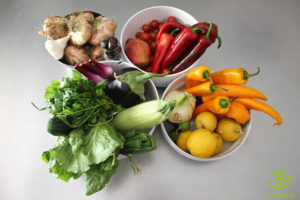How to strengthen your immune system with food? This article shows us what the immune system is and what influence nutrition has.
Autumn and winter strain the immune system.
The constant change between warm and cold air carries the risk of colds due to incorrect clothing. Dry heating air and insufficient air humidity in the office dry out the respiratory tract. This is another cause of colds.
How to strengthen your immune system with food
How can you improve your immune system? Overall, your immune system makes a remarkable contribution to the defence against pathogenic microorganisms. But sometimes it fails: A germ penetrates successfully and makes you ill. Is it possible to intervene in this process and strengthen your immune system? What if you improve your diet? Do you take any vitamins or herbal supplements? Other lifestyle changes in the hope of an almost perfect immune response?
What can you do to strengthen your immune system?
 The idea of increasing your immunity is tempting, but the ability to do so has proved difficult for several reasons. The immune system is exactly that – a system, not a single unit. To function well, balance and harmony are needed. There is still much the researchers do not know about the subtleties and interrelationships of the immune response. So far there are no scientifically proven direct connections between lifestyle and increased immune function.
The idea of increasing your immunity is tempting, but the ability to do so has proved difficult for several reasons. The immune system is exactly that – a system, not a single unit. To function well, balance and harmony are needed. There is still much the researchers do not know about the subtleties and interrelationships of the immune response. So far there are no scientifically proven direct connections between lifestyle and increased immune function.
But this does not mean that the effects of lifestyle on the immune system are not fascinating and should not be studied. Researchers are studying the effects of diet, exercise, age, mental stress and other factors on the immune response in both animals and humans. Meanwhile, general strategies for a healthy life are a good way to give your immune system the upper hand.
Immunity in action
 A healthy immune system can defeat invading pathogens as shown above, whereby two bacteria that cause gonorrhea cannot keep up with the large phagocytes, the so-called neutrophils, that devour and kill them (see arrows).
A healthy immune system can defeat invading pathogens as shown above, whereby two bacteria that cause gonorrhea cannot keep up with the large phagocytes, the so-called neutrophils, that devour and kill them (see arrows).
Healthy ways to strengthen the immune system
Your first line of defense is to choose a healthy lifestyle. Following the general health guidelines is the best step you can take to naturally keep your immune system strong and healthy. Every part of your body, including your immune system, works better if it is protected from environmental attacks and supported by such strategies:
- Not smoking.
- Eat a diet with lots of fruit and vegetables.
- Train regularly.
- Hold a healthy weight.
- If you drink alcohol, drink only in moderation.
- Sufficient sleep.
- Avoid infections such as frequent hand washing and thorough cooking of meat.
- Try to minimize stress.
Enhancing the immune system in a healthy way
Many products on the shelves claim to strengthen or support immunity. But the concept of strengthening immunity makes little scientific sense. In fact, increasing the number of cells in your body – immune cells or others – is not necessarily a good thing. For example, athletes who do “blood doping”, i.e. pumping blood into their systems to increase their number of blood cells and increase their performance, run the risk of suffering a stroke.
Trying to strengthen the cells of your immune system is particularly complicated because there are so many different types of cells in the immune system that respond to so many different microbes in so many ways. Which cells should you amplify and on what number? So far the scientists do not know the answer. It is known that the body constantly produces immune cells. Surely it produces much more lymphocytes than it can use. The additional cells move away through a natural process of cell death called apoptosis – some before they see an action, others after the battle is won. Nobody knows how many cells or which cell mix the immune system needs to function optimally.
Don’t avoid the cold weather
In general, hardening and moistening are two of the simplest countermeasures.
One can harden oneself for example with Kneipp castings, change showers or cold washings. These should only be applied to the warm, never to the cooled body. Humidification should take place largely from the inside, i.e. by drinking and inhaling moist air. However, humidifiers in bedrooms and living rooms easily lead to mould. It is better to ventilate several times a day and to change the dry room air. At least three half-hour walks in fresh air fill the lungs with enough moisture. Twice a week you should do endurance or outdoor sports. If you still suffer from dehydrated airways and cough constantly, an inhaler with salt water can help.
Be careful with your diet
Healthy food rich in vital substances is one of the most important pillars of nutrition. Eighty percent of our immune system is in the intestine. Instead of combining fast food, frozen food and ordering pizza online with vitamin tablets, you should eat fresh salads, fruit, vegetables and wholemeal products. This provides the body with vitamin C, selenium and zinc, among others, which are particularly important during the cold period. It also gets enough fibre to keep the intestines healthy. If more vitamin C is needed in times of stress, sea buckthorn, elderberry juice, acerola, leek, sauerkraut, kale and other cabbage varieties are natural sources that spice up the immune system. If your neck is already scratched, you can press a raw clove of garlic under the topping and then drink sage tea.

It is recommended to go to bed early.
Healthy sleep gives the immune system the opportunity to do its job. Experienced physicians know that heavy digestive work deprives the immune system of capacity. During the cold season, you should therefore eat something easily digestible in the evening. This allows the immune system to run at full speed at night.
Nutrition and immune system
Like any fighting force, the army of the immune system marches on its stomach. Healthy immune system warriors need a good, regular diet. Scientists have long recognized that people living in poverty and malnourished are more susceptible to infectious diseases. However, it is not certain whether the increased rate of disease is caused by the effect of malnutrition on the immune system. There are still relatively few studies on the effects of nutrition on the human immune system, and even fewer studies that directly link the effects of nutrition to the development (compared to treatment) of diseases.
There is evidence that various micronutrient deficiencies – such as deficiencies in zinc, selenium, iron, copper, folic acid and vitamins A, B6, C and E – alter the immune response in animals, as measured in the test tube. However, the effects of these changes in the immune system on animal health are less obvious and the effects of similar deficiencies on the human immune response still need to be assessed.
What can you do?
If you suspect that your diet does not supply you with all your micronutrient needs – perhaps you do not like vegetables, for example – taking a daily multivitamin and mineral supplement can bring other health benefits that go beyond all possible positive effects on the immune system. Not taking mega doses of a single vitamin. More is not necessarily better.
Do you improve immunity with herbs and supplements?
When you go to a store, you will find bottles of pills and herbal supplements that claim to support immunity or otherwise promote the health of your immune system. Although some preparations have been found to modify some components of immune function, there is no evidence to date that they strengthen immunity to such an extent that you are better protected against infections and diseases. Proving whether an herb – or other substance – can increase immunity has so far been a very complicated matter. For example, scientists do not know whether an herb that seems to increase the antibodies in the blood actually does something for general immunity.




